When Western media discusses terrorism against the West, such as 9/11, the motive is almost always left out, even when the terrorists state they are avenging longstanding Western violence in the Muslim world, reports Joe Lauria.
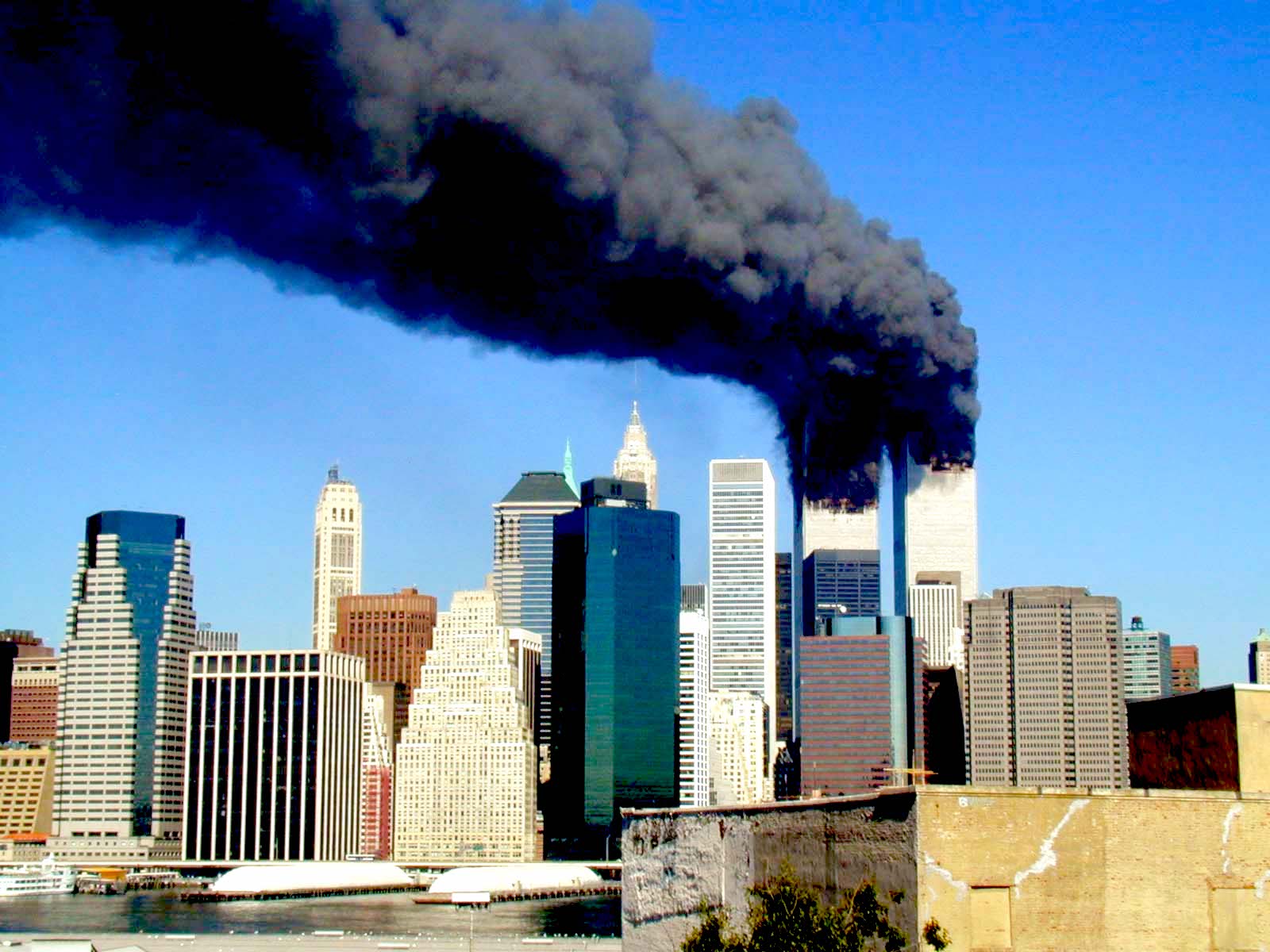
Lower Manhattan skyline after a Boeing 767 hit the World Trade Towers on Sept. 11, 2001. (Michael Foran, CC BY 2.0, Wikimedia Commons)
By Joe Lauria
Special to Consortium News
April 9, 2016
After a Russian commercial airliner was downed over Egypt’s Sinai last October [2015], Western media reported that the Islamic State bombing was retaliation against Russian airstrikes in Syria. The killing of 224 people, mostly Russian tourists on holiday, was matter-of-factly treated as an act of war by a fanatical group without an air force resorting to terrorism as a way to strike back.
Yet, Western militaries have killed infinitely more innocent civilians in the Middle East than Russia has. Then why won’t Western officials and media cite retaliation for that Western violence as a cause of terrorist attacks on New York, Paris and Brussels?
Instead, there’s a fierce determination not to make the same kinds of linkages that the press made so easily when it was Russia on the receiving end of terror. [See Consortium News’s “Obama Ignores Russian Terror Victims.”]
For example, throughout four hours of Sky News’ coverage of the July 7, 2005 attacks in London, only the briefest mention was made about a possible motive for that horrific assault on three Underground trains and a bus, killing 52 people. But the attacks came just two years after Britain’s participation in the murderous invasion of Iraq.
Prime Minister Tony Blair, one of the Iraq War’s architects, condemned the loss of innocent life in London and linked the attacks to a G-8 summit he’d opened that morning. A TV host then read and belittled a 10-second claim of responsibility from a self-proclaimed Al Qaeda affiliate in Germany saying that the Iraq invasion was to blame. There was no more discussion about it.
To explain why these attacks happen is not to condone or justify terrorist outrages against innocent civilians. It is simply a responsibility of journalism, especially when the “why” is no mystery. It was fully explained by Mohammad Sidique Khan, one of the four London suicide bombers. Though speaking for only a tiny fraction of Muslims, he said in a videotaped recording before the attack:
“Your democratically-elected governments continuously perpetuate atrocities against my people all over the world. And your support of them makes you directly responsible, just as I am directly responsible for protecting and avenging my Muslim brothers and sisters. Until we feel security you will be our targets and until you stop the bombing, gassing, imprisonment and torture of my people we will not stop this fight. We are at war and I am a soldier. Now you too will taste the reality of this situation.”
The Islamic State published the following reason for carrying out last November’s [2015] Paris attacks:
“Let France and all nations following its path know that they will continue to be at the top of the target list for the Islamic State and that the scent of death will not leave their nostrils as long as they partake part in the crusader campaign … and boast about their war against Islam in France, and their strikes against Muslims in the lands of the Caliphate with their jets.”
Claiming It’s a State of Mind
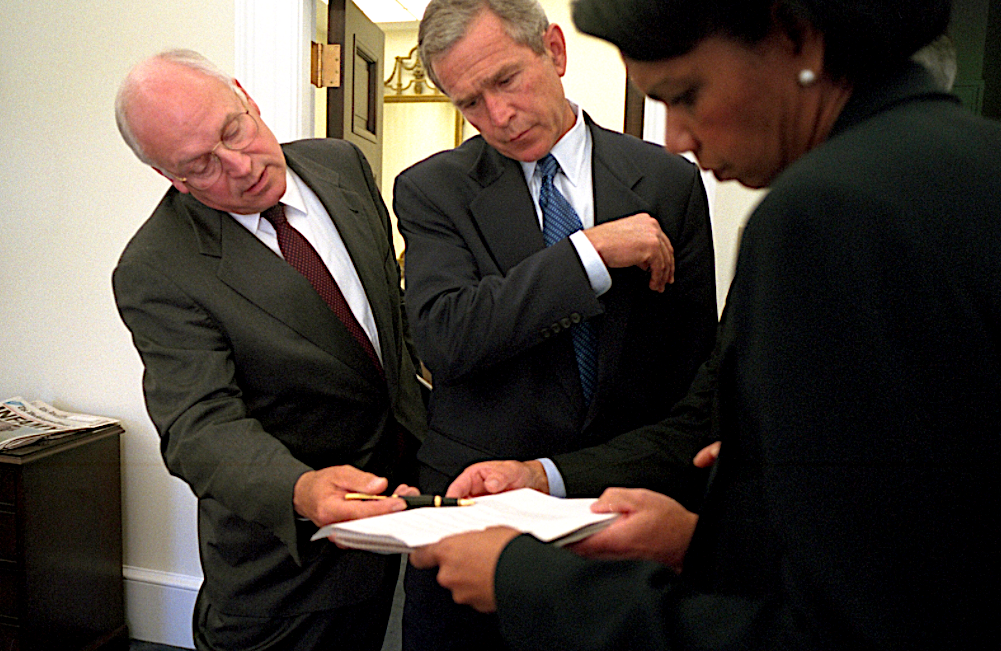
Sept. 12, 2001: President George W. Bush, center, with Vice President Dick Cheney and National Security Advisor Condoleezza Rice looking over a brief together in the White House. (U.S. National Archives)
Ignoring such clear statements of intent, we are instead served bromides by the likes of State Department spokesman Mark Toner about the Brussels bombings, saying it is impossible “to get into the minds of those who carry out these attacks.”
Mind reading isn’t required, however. The Islamic State explicitly told us in a press statement why it did the Brussels attacks: “We promise black days for all crusader nations allied in their war against the Islamic State, in response to their aggressions against it.”
Yet, still struggling to explain why it happened, Toner said, “I think it reflects more of an effort to inflict on who they see as Western or Westerners … fear that they can carry out these kinds of attacks and to attempt to lash out.”
Toner ascribed the motive to a state of mind: “I don’t know if this is about establishing a caliphate beyond the territorial gains that they’ve tried to make in Iraq and Syria, but it’s another aspect of Daesh’s kind of warped ideology that they’re carrying out these attacks on Europe and elsewhere if they can. … Whether it’s the hopes or the dreams or the aspirations of a certain people never justifies violence.”
After 9/11, President George W. Bush infamously said the U.S. was attacked because “they hate our freedoms.” It’s a perfect example of a Western view that ascribes motives to Easterners without allowing them to speak for themselves or taking them seriously when they do.
Explaining his motive behind 9/11, Osama bin Laden, in his Letter to America, expressed anger about U.S. troops stationed on Saudi soil. Bin Laden asked: “Why are we fighting and opposing you? The answer is very simple: Because you attacked us and continue to attack us.” (Today the U.S. has dozens of bases in seven countries in the region.)
During a Republican presidential debate in 2008 Rudy Giuliani, who was New York mayor on 9/11, became incensed and demanded Ron Paul withdraw his remark that the U.S. was attacked because of U.S. violent interventions in Muslim countries.
“Have you ever read about the reasons they attacked us?” Paul said. “They attacked us because we have been over there. We’ve been bombing Iraq for ten years. I’m suggesting we listen to the people who attacked us and the reason they did it.”
“That’s an extraordinary statement,” responded Giuliani. “As someone who lived through the attack of Sept. 11, that we invited the attack, because we were attacking Iraq. I don’t think I’ve ever heard that before. And I’ve heard some pretty absurd explanations for Sept. 11.”
The audience had never heard it either, as they heartily cheered Giuliani.
“And I would ask the Congressman to withdraw that comment and tell us that he didn’t really mean that,” Giuliani said.
“I believe very sincerely when the CIA teach and speak about blowback,” Paul responded. “If we think that we can do what we want around the world and not incite hatred, then we have a problem. They don’t come here to attack us because we are rich and we are free. They attack us because we are over there.”
So why won’t Western officials and corporate media take the jihadists’ statements of intent at face value? Why won’t they really tell us why we are attacked?
It seems to be an effort to cover up a long and ever more intense history of Western military and political intervention in the Middle East and the violent reactions it provokes, reactions that put innocent Western lives at risk. Indirect Western culpability in these terrorist acts is routinely suppressed, let alone evidence of direct Western involvement with terrorism.
Some government officials and journalists might delude themselves into believing that Western intervention in the Middle East is an attempt to protect civilians and spread democracy to the region, instead of bringing chaos and death to further the West’s strategic and economic aims. Other officials must know better.
1920-1950: A Century of Intervention Begins
A few might know the mostly hidden history of duplicitous and often reckless Western actions in the Middle East. It is hidden only to most Westerners, however. So it is worth looking in considerable detail at this appalling record of interference in the lives of millions of Muslims and peoples of other faiths to appreciate the full weight it exerts on the region. It can help explain anti-Western anger that spurs a few radicals to commit atrocities in the West.
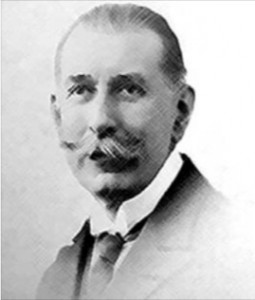
French diplomat Francois George-Picot and British colonial officer Mark Sykes drew lines across a Middle East map of the Ottoman Empire after World War I, carving out states with boundaries that are nearly the same today.
The history is an unbroken string of interventions from the end of the First World War until today. It began after the war when Britain and France double-crossed the Arabs on promised independence for aiding them in victory over the Ottoman Empire. The secret 1916 Sykes-Picot accord divided the region between the European powers behind the Arabs’ backs. London and Paris created artificial nations from Ottoman provinces to be controlled by their installed kings and rulers with direct intervention when necessary.
What has followed for 100 years has been continuous efforts by Britain and France, superseded by the United States after the Second World War, to manage Western dominance over a rebellious region.
The new Soviet government revealed the Sykes-Picot terms in November 1917 in Izvestia. When the war was over, the Arabs revolted against British and French duplicity. London and Paris then ruthlessly crushed the uprisings for independence.
France defeated a proclaimed Syrian government in a single day, July 24, 1920, at the Battle of Maysalun. Five years later there was a second Syrian revolt, replete with assassinations and sabotage, which took two years to suppress. If you walk through the souk in Old Damascus and look up at the corrugated iron roof you see tiny specks of daylight peeking through. Those are bullet holes from French war planes that massacred civilians below.
Britain put down a series of independence revolts in Iraq between 1920 and 1922, first with 100,000 British and Indian troops and then mostly with the first use of air power in counterinsurgency. Thousands of Arabs were killed. Britain also helped its installed King Abdullah put down rebellions in Jordan in 1921 and 1923.
London then faced an Arab revolt in Palestine lasting from 1936 to 1939, which it brutally crushed, killing about 4,000 Arabs. The next decade, Israeli terrorists drove the British out of Palestine in 1947, one of the rare instances when terrorists attained their political goals.
Germany and Italy, late to the Empire game, were next to invade North Africa and the Middle East at the start of the Second World War. They were driven out by British imperial forces (largely Indian) with U.S. help. Britain invaded and defeated nominally independent Iraq, which had sided with the Axis. With the Soviet Union, Britain also invaded and occupied Iran.
After the war, the U.S. assumed regional dominance under the guise of fending off Soviet regional influence. Just three years after Syrian independence from France, the two-year old Central Intelligence Agency engineered a Syrian coup in 1949 against a democratic, secular government. Why? Because it had balked at approving a Saudi pipeline plan that the U.S. favored. Washington installed Husni al-Za’im, a military dictator, who approved the plan.
1950s: Syria Then and Now
Before the major invasion and air wars in Iraq and Libya of the past 15 years, the 1950s was the era of America’s most frequent, and mostly covert, involvement in the Middle East. The first coup of the Central Intelligence Agency was in Syria in March 1949. The Eisenhower administration then wanted to contain both Soviet influence and Arab nationalism, which revived the quest for an independent Arab nation. After a series of coups and counter-coups, Syria returned to democracy in 1955, leaning towards the Soviets.
A 1957 Eisenhower administration coup attempt in Syria, in which Jordan and Iraq were to invade the country after manufacturing a pretext, went horribly wrong, provoking a crisis that spun out of Washington’s control and brought the U.S. and Soviets to the brink of war.
Turkey put 50,000 troops on the Syrian border, threatening to invade. Soviet premier Nikita Khrushchev threatened Turkey with an implied nuclear attack and the U.S. got Ankara to back off. This sounds eerily familiar to what happened in March 2015 month when Turkey again threatened to invade Syria and the U.S. put on the brakes. The main difference is that Saudi Arabia in 1957 was opposed to the invasion of Syria, while it was ready to join it last month. [See Consortiumnews.com’s “Risking Nuclear War for Al Qaeda?“]
In the 1950s, the U.S. also began its association with Islamic religious extremism to counter Soviet influence and contain secular Arab nationalism. “We should do everything possible to stress the ‘holy war’ aspect,” President Eisenhower told his Secretary of State John Foster Dulles. After the Cold War, religious extremists, some still tied to the West, became themselves the excuse for U.S. intervention.
Despite U.S. regional ascendance in the 1950s, Britain and France weren’t through. In 1953, an MI6-CIA coup in Iran replaced a democracy with a restored monarchy when Mohammed Mossadegh, the elected prime minister, was overthrown after seeking to nationalize British-controlled Iranian oil. Britain had discovered oil in Iran in 1908, spurring deeper interest in the region.
Three years later Britain and France combined with Israel to attack Egypt in 1956 when President Gamal Abdel Nasser, who had taken over from the ousted British-backed King Farouk, moved to nationalize the Suez Canal. The U.S. stopped that operation, too, denying Britain emergency oil supplies and access to the International Monetary Fund if the Brits didn’t back down.
Suez represented the final shift in external power in the Middle East from the U.K. to the U.S. But Washington couldn’t (or wouldn’t) stop Britain from trying and failing to assassinate Nasser, who had sparked the Arab nationalist movement.
In 1958, the U.S. landed 14,000 Marines in Lebanon to prop up President Camille Chamoun after a civil conflict broke out against Chamoun’s intention to change the constitution and run for reelection. The rebellion was minimally supported by the United Arab Republic, the 1958-61 union between Egypt and Syria. It was the first U.S. invasion of an Arab country, excluding the U.S.’s World War II intervention in North Africa.
1960 to 2003: Interventions Post Colonial
The 1954-1962 Algerian rebellion against French colonialism, which Paris brutally tried to suppress, included Algerian acts of terrorism. Exhibiting the same cluelessness displayed by State Department spokesman Toner, the French attitude towards the uprising was expressed by an exasperated French officer in film The Battle of Algiers when he exclaimed, “What do you people want?”
From the 1960s to the 1980s, U.S. intervention in the region was mostly restricted to military support for Israel in the 1967 and 1973 Arab-Israeli wars. From an Arab perspective that represented a major U.S. commitment to protect Israeli colonialism.
The Soviet Union also intervened directly in the 1967-70 War of Attrition between Egypt and Israel when Nasser went to Moscow to say he’d resign and have a pro-Western leader take over if the Russians didn’t come to his aid. In backing Nasser, the Soviets lost 58 men.
The Soviets were also involved in the region to varying degrees and times throughout the Cold War, giving aid to Palestinians, Nasser’s Egypt, Syria, Saddam’s Iraq and Muammar Gaddafi’s Libya — all countries and leaders charting an independent course from the West.
During the 1970 Black September conflict between Jordan and Palestinian guerrillas, the U.S. had Marines poised to embark in Haifa and ready to secure Amman airport when Jordan repelled a Syrian invasion in support of the Palestinians.
In the 1980s the U.S. backed Saddam Hussein in his brutal, eight-year war with Iran, supplying him with arms, intelligence and chemical weapons, which he did not hesitate to use against Iranians and Kurds. President Ronald Reagan also bombed Libya in 1986 after accusing it without conclusive evidence of a Berlin bombing ten days earlier that killed a U.S. soldier.
The U.S. returned more directly to the region with a vengeance in the 1991 Gulf War, burying alive surrendering Iraqi troops with bulldozers; shooting thousands of soldiers in the back as they retreated on the Highway of Death, and calling for uprisings in the Shia south and Kurdish north and then leaving them to Saddam’s revenge.
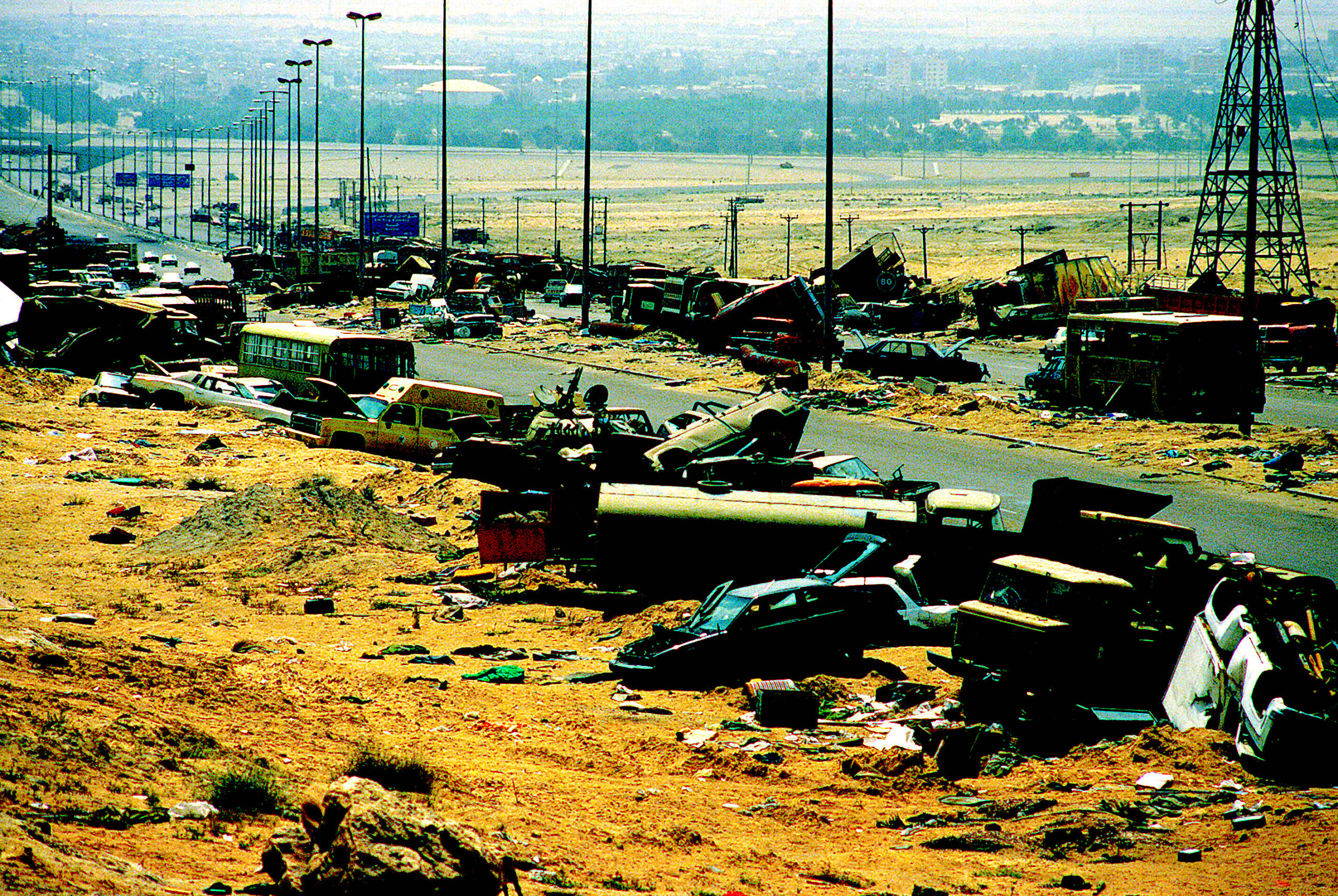
April 18,1991: Demolished vehicles line Highway 80, also known as the “Highway of Death”, the route fleeing Iraqi forces took as they retreated fom Kuwait during Operation Desert Storm. (Joe Coleman, Air Force Magazine, Wikimedia Commons)
Iraq never recovered fully from the devastation, being crushed for 12 years under U.N. and U.S. sanctions that then U.N. Ambassador Madeleine Albright admitted contributed to the deaths of half a million Iraqi children. But she said it was “worth it.”
Iraq’s sanctions only ended after the 2003 full-scale U.S. and British invasion of the sovereign Arab nation, an assault justified by bogus claims about Iraq hiding stockpiles of WMD that could be shared with Al Qaeda. The invasion killed hundreds of thousands of people and left Iraq devastated. The invasion also unleashed a civil war and gave rise to the terrorist group, the Islamic State in Iraq, which later merged with terrorists in Syria to become ISIS.
Throughout this century of intervention, Britain, France and the U.S. managed the region through strong alliances with dictators or monarchs who had no regard for democratic rights. But when those autocrats became expendable, such as Saddam Hussein had, they are disposed of.
The Biggest Invasion Yet
While most Americans may be unaware of this long history of accumulated humiliation of Muslims, Christians and other religious minorities in the region — and the resulting hatred of the West — they can’t ignore the Iraq invasion, the largest by the West in the region, excluding World War II. Nor is the public unaware of the 2011 intervention in Libya, and the chaos that has resulted. And yet no link is made between these disasters and terror attacks on the West.
The secular strongmen of Iraq, Libya and Syria were targeted because they dared to be independent of Western hegemony — not because of their awful human rights records. The proof is that Saudi Arabia’s and Israel’s human rights records also are appalling, but the U.S. still staunchly stands by these “allies.”
During the so-called Arab Spring, when Bahrainis demanded democracy in that island kingdom, the U.S. mostly looked the other way as they were crushed by a combined force of the nation’s monarchy and Saudi troops. Washington also clung to Egyptian strongman Hosni Mubarak until the bitter end.
However, under the pretext of protecting the Libyan population, the U.S. and NATO implemented a bloody “regime change” in Libya leading to anarchy, another failed state and the creation of one more ISIS enclave. For the past five years, the West and its Gulf allies have fueled the civil war in Syria, contributing to another humanitarian disaster.
The West’s motive for all this meddling is often pinned on oil. But obedience is a strong factor. Hans Morgenthau wrote in Politics Among Nations (1968), that the urge of empires to expand “will not be satisfied so long as there remains anywhere a possible object of domination – a politically organized group of men which by its very independence challenges the conqueror’s lust for power.”
Tariq Ali, in his 2003 book Bush in Babylon, writes about Gnaeus Julius Agricola, the Roman general responsible for much of the conquest of Britain in the First Century: “On one of his visits to the outer reaches of [Britain], Agricola looked in the direction of Ireland and asked a colleague why it remained unoccupied. Because, came the reply, it consisted of uncultivable bog lands and was inhabited by very primitive tribes. What could it possibly have to offer the great Empire? The unfortunate man was sternly admonished. Economic gain isn’t all. Far more important is the example provided by an unoccupied country. It may be backward, but it is still free.”
Cloaking Motives
Little of this long history of Western manipulation, deceit and brutality in the Middle East is known to Americans because U.S. media almost never invokes it to explain Arab and Iranian attitudes towards the West.
Muslims remember this history, however. I know Arabs who are still infuriated by the Sykes-Picot backstabbing, let alone the most recent depredations. Indeed fanatics like the Islamic State are still ticked off about the Crusades, a much earlier round of Western intervention. In some ways it’s surprising, and welcomed, that only the tiniest fraction of Muslims has turned to terrorism.
Nevertheless, Islamophobes like Donald Trump want to keep all Muslims out of the U.S. until he figures out “what the hell is going on.” He says Muslims have a “deep hatred” of Americans. But he won’t figure it out because he’s ignoring the main cause of that hatred – the past century of intervention, topped by the most recent Western atrocities in Iraq and Libya.
Stripping out the political and historical motives renders terrorists as nothing more than madmen fueled by irrational hate of a benevolent West that says it only wants to help them. They hate us simply because we are Western, according to people like Toner, and not because we’ve done anything to them.
Israel and its Western enablers likewise bury the history of Israel’s ethnic cleansing and piecemeal conquest of Palestine so they can dismiss Palestinians who turn to terrorism as motivated only by hatred of Jews for being Jews.
I’ve asked several Israelis why Palestinians tend to hate them. The more educated the Israeli the more likely the answer was because of the history of how Israel was established and how it continues to rule. The less educated my respondent, the more likely I heard that they hate us simply because we are Jews.
There’s no excuse for terrorism. But there is a practical way to curb it: end the current interventions and occupations and plan no more.
The Psychology of Terror
Of course, anger at the West’s history of exploiting Muslim lands isn’t the only motivation for terrorism. There are emotional and group pressures that push some over the line to strap on bombs and blow up innocent people around them. Thankfully, it takes a very unusual type of individual to react to this ugly history with ugly acts of terror.
Money also plays a part. We’ve seen waves of defections as ISIS has recently cut fighters’ pay in half. Anger at Western-installed and propped-up local rulers who oppress their people on behalf of the West is another motive. Extremist preachers, especially Saudi Wahhabis, also share the blame as they inspire terrorism, usually against Shia.
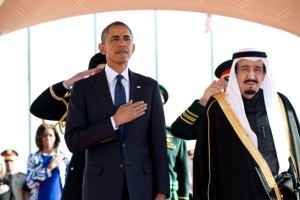
Obama and King Salman, Jan. 27, 2015, at Obama’s State Visit to Saudi Arabia. (Official White House Photo by Pete Souza).
Wading into the psychology of why someone turns to terrorism is an unenviable task. The official Western view is that Islamist extremists merely hate modernity and secularism. That might be their motive in wanting to backwardly transform their own societies by removing Western influence. But it’s not what they say when they claim responsibility for striking inside the West.
To ignore their words and dismiss their violent reaction to the long and ongoing history of Western intervention may shield Americans and Europeans from their partial responsibility for these atrocities. But it also provides cover for the continuing interventions, which in turn will surely produce more terrorism.
Rather than looking at the problem objectively – and self-critically – the West ludicrously cloaks its own violence as an effort to spread democracy (which never seems to materialize) or protect civilians (who are endangered instead). To admit any connection between the sordid historical record and anti-Western terrorism would be to admit culpability and the price that the West is paying for its dominance.
Worse still, letting terrorists be perceived as simply madmen without a cause allows the terrorist response to become justification for further military action. This is precisely what the Bush administration did after 9/11, falsely seeking to connect the attacks to the Iraqi government.
By contrast, connecting terrorism to Western intervention could spark a serious self-examination of the West’s behavior in the region leading to a possible retreat and even an end of this external dominance. But that is clearly something policymakers in Washington, London and Paris – and their subservient media – aren’t prepared to do.
This article was first published in Consortium News on April 9, 2016.
[For more on this topic, see Consortiumnews.com’s “Why Many Muslims Hate the West” and “Muslim Memories of Western Imperialism.”]
Joe Lauria is editor-in-chief of Consortium News and a former UN correspondent for The Wall Street Journal, Boston Globe, and numerous other newspapers. He was an investigative reporter for the Sunday Times of London and began his professional work as a stringer for The New York Times. He can be reached at joelauria@consortiumnews.com and followed on Twitter @unjoe


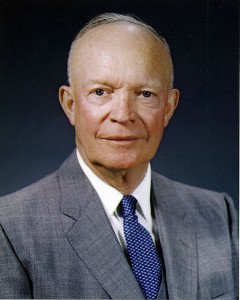


War is the rich man’s Terror. Terror is the poor man’s war.
I was born in 1947. I enjoyed the best of the American Empire, never aware of how America got to be so “great”. On one hand I am grateful. On the other I am saddened that so many suffered because of American hegemony. That is nothing to be proud of. Now the empire is collapsing and another empire will take its place. It is the history of empire.
Excellent work, Joe Lauria.
Let’s not forget the first 9/11 (/1973). The fact that we see Chile in 1973 as just business as usual throws light on why we can’t understand why “they” hate us so much. Do a search on “Obama Chile” and all but one result is recipes for the Obama family’s famous chili. Obama in fact avoided admitting the US’s guilt for the overthrow of Chile’s constitutional government, saying that he preferred to look to the future rather than “speak to the policies of the past.”
The point is that we Americans continue to refuse to face the reality of what we actually do in the world, as opposed to the rhetoric we wrap it in. “They hate us” is a good example of that rhetoric. And the reason we refuse to see the simple truth is that, as the late great William Blum never ceased point out, we really believe that we play fair.
And yet it’s not really all that hard to accept the US’s evil if we remember the slogan, “The Business of America is Business.” That’s really all it’s about. Money just doesn’t play fair. But for some reason, we Americans feel we have to believe that we have higher motives, and that is the chink in our armor, the opening through which we continue to unleash so much destruction and terror on the world.
In an ongoing war one does not take the blame. America has been in an ongoing war and it is understood that nations will retaliate in one way or the other. What makes US foreign policy unique is the method of assessing a threat by setting up a base near a nation and then claiming that this nation is an existential threat to that base and by that is a threat to America.
It is a fool proof method as long as America has the technology and the wealth to generate an artificial threat. It makes building bases a necessary requirement to initiate and sustain a war. But it expands America’s reach at a prohibitive cost and guarantees an endless supply of enemies. It also guarantees endless war
RE: “The West’s motive for all this meddling is often pinned on oil. But obedience is a strong factor. Hans Morgenthau wrote in Politics Among Nations (1968), that the urge of empires to expand “will not be satisfied so long as there remains anywhere a possible object of domination – a politically organized group of men which by its very independence challenges the conqueror’s lust for power.”
Tariq Ali, in his 2003 book Bush in Babylon, writes about Gnaeus Julius Agricola, the Roman general responsible for much of the conquest of Britain in the First Century: “On one of his visits to the outer reaches of [Britain], Agricola looked in the direction of Ireland and asked a colleague why it remained unoccupied. Because, came the reply, it consisted of uncultivable bog lands and was inhabited by very primitive tribes. What could it possibly have to offer the great Empire? The unfortunate man was sternly admonished. Economic gain isn’t all. Far more important is the example provided by an unoccupied country. It may be backward, but it is still free.”
we never question the mental health of our candidates before we elect them
Norman Mailer’s fictional biography of Hitler’s youth, “The High Castle” suggests we should.
if our presidents don’t start out as bullies and they’re weak knee’d our national security state (full of Agricolas) will drive them to it
Mr. Lauria, I must disagree with your definition of terrorism. Legitimate governments have targetted civilians since at least Sherman in Georgia. Certainly all sides in both world war targetted civilians deliberately. Think of the firebombings of Dresden and of Tokyo, among innumerable other examples.
To get personal, when I was repairing A-6 bombers on an aircraft carrier in the Tonkin Gulf, it was perfectly clear to me that I was helping kill civilians. When F. Marcos staged his coup d’etat in the Philippines, it also was obvious to me that I wasn’t defending democracy there, either.
You have completely misunderstood my definition. I never said governments don’t target civilians. The definition depends on the actor. When governments target civilians they are committing war crimes. When non-state actors target civilians they are committing terrorism. War crimes are even worse than terrorism, so I’m in no way letting governments off the hook. — Joe Lauria
Thanks for the excellent historical survey. The photo of Picot is new to me.
it is all empire building for the sunni, arms sales, and keeping the petrodollar alive:
see: change.org/antiwarnow
An excellent article and historical summary by Joe Lauria, for which thanks.
Thank you, once again, Joe Lauria for outstanding history lessons of importance. How you have the energy and smarts to write this is amazing. If only somehow, someway a wider readership were available for you. I will paste and copy your article and send to some friends. As a long ago Political Science major (at Brooklyn College CUNY), I learned about the increasing Imperial Presidency . . . your linkage to the Roman era of empire building is apt. Please know there are people now (and ahead) who need your insights. All the best, Carolyn Grassi (poet and former Political Science (part-time) teacher in California community colleges)
Don’t neglect the impact of European and Russian meddling in the nineteenth century with the Ottoman Empire, which then exercised control over the Middle East. These powerful nations regularly challenged Ottoman sovereignty diplomatically and militarily, under the guise of protecting Christian minority populations, forcing the adoption of new policies from the Balkans to Lebanon and Syria and Egypt.. Ultimately this constant humiliation and hemorrhaging of territory led to the Union and Progress movement in Turkey. This party defined a new national identity, ultimately embarking on a campaign of ethnic cleansing of non-Moslems that would culminate in the Armenian massacres, as Ottoman rule crumbled in the final string of defeats in the Great War.
Thanks for this article, Joe Lauria.
It was hard to observe the horror of people jumping from the inflamed towers and disconnect that image from the vicious for profit assaults our governing class exacts on mounting millions of brown and black peoples around the world.
The irony of it all can be found in the great Randy Newman’s “Political Science”
Lyrics:
No one likes us
I don’t know why
We may not be perfect
But heaven knows we try
But all around
Even our old friends put us down
Let’s drop the big one
And see what happens
We give them money
But are they grateful
No, they’re spiteful
And they’re hateful
They don’t respect us
So let’s surprise them
We’ll drop the big one
And pulverize them
Asia’s crowded
And Europe’s too old
Africa’s far too hot
And Canada’s too cold
And South America stole our name
Let’s drop the big one
There’ll be no one left to blame us
We’ll save Australia
Don’t want to hurt no kangaroo
We’ll build an all American amusement park there
They’ve got surfing, too
Boom goes London
And boom Paris
More room for you
And more room for me
And every city the whole world round
Will just be another American town
Oh, how peaceful it’ll be
We’ll set everybody free
You’ll have Japanese kimonos, baby
There’ll be Italian shoes for me
They all hate us anyhow
So let’s drop the big one now
Let’s drop the big one now
hxxps://lancasteronline DOT com/randy-newman—political-science-lyrics/video_e9d784e8-396a-11ea-aeb2-873890482544.html
The continuous, unconditional support for Israel seems to make us a lot of enemies over there. And considering that it was Saudis that attacked us on 9/11, it is really appalling that Bush attacked Afghanistan and Iraq, and they even allowed all the Saudis that were here that morning, some meeting with papa Bush, to leave the US on private jets after the attack, without even questioning them, including some of Bin Laden’s family. I think George W. Bush was the worst president in the history of the world.
On 9/11, the US ambassador to the UK was interviewed on British TV. With tears in his eyes he asked in apparent wonderment “Why do they hate us so much?”
I remember thinking then, how could an ambassador be so blind to more than 50 years of US foreign policy in the Middle East?
The full text of bin Laden’s “letter to America” was printed by The Observer on Nov. 24, 2002 and is still available on The Guardian website. Bin Laden lists the reasons for his attacks on America in the following order:
(1a) “You [America] attacked us in Palestine”. . . “which has sunk under military occupation for more than 80 years.”
(1b) “You attacked us in Somalia; you supported the Russian atrocities against us in Chechnya, the Indian oppression against us in Kashmir, and the Jewish aggression against us in Lebanon.
(1c) “Under your supervision, consent and orders, the governments of our countries which act as your agents, attack us on a daily basis . . .”
(1d) (d) You steal our wealth and oil at paltry prices because of you [sic] international influence and military threats. This theft is indeed the biggest theft ever witnessed by mankind in the history of the world.
(1e) Your forces occupy our countries; you spread your military bases throughout them; you corrupt our lands, and you besiege our sanctities, to protect the security of the Jews and to ensure the continuity of your pillage of our treasures.
(1f) You have starved the Muslims of Iraq, where children die every day. It is a wonder that more than 1.5 million Iraqi children have died as a result of your sanctions, and you did not show concern. Yet when 3000 of your people died, the entire world rises and has not yet sat down.
(1g) You have supported the Jews in their idea that Jerusalem is their eternal capital, and agreed to move your embassy there. With your help and under your protection, the Israelis are planning to destroy the Al-Aqsa mosque.
Bin Laden’s Letter to America continues with a long list of grievances against decadent infidels. His letter denounces many egregious, real grievances but then calls for extreme religious fanaticism to remedy them. In large part he gets the diagnosis right, but the cure he advocates is in many respects worse than the disease.
thanks for this alley cat
seems like Bin Laden got censored not unlike our whistleblowers at trial
the truth speaks for itself although, sadly, Ray McGovern’s MICIMATT has been very effective playing the three card monte game on truth.
Great article! So refreshing to hear about ‘the elephant in the room’ explained in straightforward terms, rather than the mythological ‘we-good/they-bad’ duality that the MSM typically employs because they don’t want to upset their readers/viewers and have their ratings & sales suffer. And sadly, from a business perspective, the MSM is correct in their thinking, since we’re a land of illusion where realists are excluded from most policy discussions…
I have been quietly telling people for years – if THEY bring the subject up, because I don’t care to shout it to the rooftops in this dangerous faux-democracy and consequently have my house firebombed – that they have only been told what, who, how, where, and when about 9/11, but that our government has been too corrupt to tell then WHY 9/11 happened. My single sentence with with I tell them the reason: “Because we had it coming.” And then their eyes just go wide, so wide. Thanks for the comprehensive and honest history that supports my view.
Wow. I mostly agree with you, Joe, but when you say this : There’s no excuse for terrorism. I don’t. It’s not because I support terrorism but the reality that you vaguely allude to but don’t come out and say is this. Terrorism is the response of the militarily weak to being crushed by the militarily strong. And that is terrorism’s excuse – it’s the only avenue to respond to oppression from the powerful.
Absolutely untrue. Guerrilla warfare is the militarily weak against the militarily strong. Terrorism targets non-combatants. There’s no excuse for it.
So when a state bombs civilian areas which might contain a military target, and kills civilians, is that terrorism or just collateral damage? And does it justify a response in the same vein? Civilians have always been targetted in armed conflict. The lines are so blurred as to make the distinction moot.
Only non-state actors targeting civilians engage in terrorism. States can sponsor terrorism but don’t directly commit terrorism. They commit war crimes if civilians are targeted or killed in a disproportionate attack.
You must be careful on that. To USG, terrorism is activity of ANY kind that helps, in some ways, an organization on a list compiled by Department of State, occasionally on a specific order from POTUS, like Iranian Revolutionary Guard. And “War on terror” is waged according to that definition.
I am not familiar with the entirety of this list, but hostile attitude to USA or more precious allies matters more than committing wanton mayhem or not.
And finding “excuses” for many of these activities, and the “beneficiary” organizations is not that difficult.
Hmmm. I’m not going to argue but I will say that terrorism has been around since, like, forever. And I’m not real impressed by the US government’s approach to this. They are using it to do all kinds of evil.
The first thought that came to mind seeing the planes hitting the towers was that they’ve been asking for it. This article richly expresses in plain terms some details supporting this conclusion. Sadly too perhaps is the certain shock doctrine capitalism that voraciously feeds on these “opportunities”.
This article should be required reading for the oligarchs, even to the point, a la “Clockwork Orange”, of having their eyes propped open with sticks! But the thing I like best is the picture of Trump which–I must think intentionally–does not show him as evil. This anti-propagandistic style would be welcome for news outlets generally. We don’t need a picture of Trump with bloody fangs to know what the writer thinks of him.
Just following orders!
Long before WW II ended the ‘Allies’ decided to revoke the “war guilt” clause from the peace treaty they were already envisaging. This time, the Germans would not again have such a clause to turn to, in rebutting their acts.
And ever since, through this singlehanded sleight of hand – by their brazen machinations of legal precedents of international juridical proceedings, the US has avoided their own war guilt; each time they have unilaterally attempted to overthrow the sovereignty of arbitrary independent countries’ governments not to their liking, in the name of bringing humanitarian democracy; by simply breeching these sovereign geographical territories, while in actuality committing war crimes and crimes against humanity.
But, regrettably, as the tales of history bear witness, the all-powerful are the law.
On the opening day of the ‘International’ Military Tribunal at Nuremburg, the American prosecutor, Justice Jackson of the US Supreme Court, called the occasion “a rare moment in history”, and the day after the Nazi leaders were hanged, the NY Times said: “Mankind has entered a new world (order) of international morality.”
Was the man prescient or just another double-dealing lackey of the power structure?
The only reversal in the saga today, is that this is the extant hubris of the Übermensch American mentality.
What has changed in overall human consciousness, for the better, since the Treaty of Versailles came into effect, a little over a century ago, on the anniversary of a long forgotten historically auspicious occasion of terror?
On this day, the 20th anniversary of today’s long-proven, inauspicious, event, NOT MUCH!
This is THE question!
Note:
“They thought they were free” by Milton Mayer, 1955
On another note, Em, regarding World War II – I’ve long wondered whether the draconian cost exacted on the people of Germany after WWI caused the suffering that gave Hitler his opportunity to grab power similar to how Trump used the suffering of disenfranchised people to win his election.
Another kind of blowback?